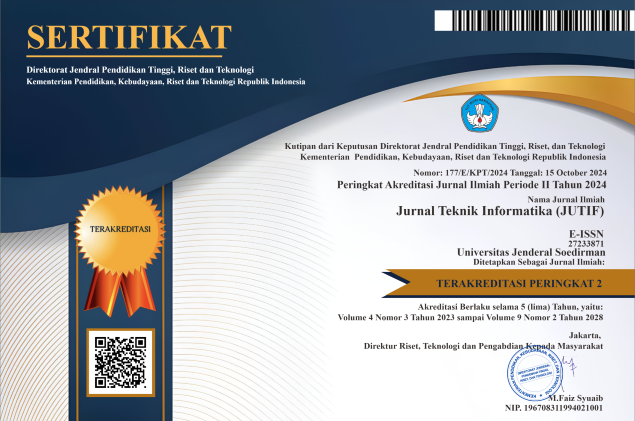ROBOTIC PROCESS AUTOMATION FOR QUALITY CONTROL ASSESSMENT USING SELENIUM
DOI:
https://doi.org/10.20884/1.jutif.2022.3.5.341Keywords:
Robotic Process Automation, Selenium, Software Quality Assurance, Testing System, WebsiteAbstract
Robotic Process Automation (RPA) is a form of technology to automate tasks and routines performed by humans, which can be instructed to machine. Along with the rapid development of technology, the time that can be used to maintain the quality of a technology is becoming increasingly narrow. Therefore, RPA will imitate activities or tasks performed by humans on a computer with a much faster processing time and 100% accuracy without "human error". The agile method was chosen in this study because of its focus on flexibility and more responsiveness to required changes. The system developed in this paper uses the Selenium library with the Python programming language and retrieves task data from the MNC IT team, especially the QC division for the RCTI+ website Quality Assessment process. From the results of testing this system, it shows that the testing process using this system and testing from a tester / examiner get the same results. However, because this system is programmed, it will have more stable and efficient results.
Downloads
References
D. Fernando and H. Harsiti, “Studi Literatur: Robotic process automation,” JSiI (Jurnal Sistem Informasi), vol. 6, no. 1, p. 6, 2019, doi: 10.30656/jsii.v6i1.1071
C. Tornbohm and R. Dunie, “Market Guide for Robotic Process Automation Software,” 2017. https://images.abbyy.com/India/market_guide_for_robotic_pro_319864%20(002).pdf (accessed: 24-May-2022).
E. Kurniadi and H. Ishi, “Harmonic analysis for 4-dimensional real frobenius lie algebras,” Springer Proceedings in Mathematics & Statistics, pp. 95–109, 2019, doi: 10.1007/978-3-030-26562-5_4
F. Fitriyani, “Makna Pesan Kesabaran Dalam Sinetron Catatan Harian Aisha Di RCTI,” Universitas Islam Negeri Syarif Hidayatullah Jakarta, 2018.
R. P. Mahardikawati and Nurgiyatna, “Sistem Informasi Industri kecil menengah Pemerintahan Kabupaten Boyolali Berbasis website,” Jurnal Teknik Informatika (Jutif), vol. 1, no. 2, pp. 53–60, 2020, doi: 10.20884/1.jutif.2020.1.2.13.
A. Kristanto, Rekayasa perangkat lunak (Konsep Dasar). Gava Media Yogyakarta.
L. Ivančić, D. Suša Vugec, and V. Bosilj Vukšić, “Robotic Process Automation: Systematic Literature Review,” Business Process Management: Blockchain and Central and Eastern Europe Forum, vol. 361, pp. 280–295, 2019, doi: 10.1007/978-3-030-30429-4_19.
G. L., Sigurðardóttir, “Robotic process automation: dynamic roadmap for successful implementation,” Reykjavík University, 2018.
I. Shuaibu, M. Musa, and M. Ibrahim, “Investigation onto the Software Testing Techniques and Tools: An Evaluation and Comparative Analysis,” International Journal of Computer Applications, vol. 177, no. 23, pp. 24–30, Dec. 2019, doi: 10.5120/ijca2019919685.
W. Jiang and J. Deng, “Design and Implementation of On-Line Practice System Based on Software Testing,” Journal of Physics: Conference Series, vol. 1738, no. 1, p. 012115, Jan. 2021, doi: 10.1088/1742-6596/1738/1/012115.
E. Supriyanto, “Macam – Macam Testing Sistem Informasi,” Dinamik, vol. 10, no. 1, p. 46, 2005, doi: 10.35315/dinamik.v10i1.10
Hariyanto, T. Dirgahayu, and H. P. Putro, “Software Quality Assurance pada Perusahaan Pengembang Perangkat Lunak Skala Kecil dan Menengah,” JARTIKA Jurnal Riset Teknologi dan Inovasi Pendidikan, vol. 3, no. 2, pp. 283–294, Jul. 2020, doi: 10.36765/jartika.v3i2.265.
C. Nguyen, “New Learning Management Website Application Design,” Haaga-Helia University, 2021.
K. A. Prasetyo and A. K. Nugroho, “Web-Based Technical Supervision And Planning Reports Information System In Cv. Tata Saka Consultant,” Jurnal Teknik Informatika (Jutif), vol. 3, no. 1, pp. 1-10, 2022, doi: 10.20884/1.jutif.2022.3.1.17.
I. C. Mauko, N. M. Setiohardjo, and F. P. Noach, “Pengembangan Website Unit Penelitian Dan Pengabdian Kepada Masyarakat Dan Penerapan Jurnal Elektronik Berbasis Open Source Di Politeknik Negeri Kupang,” Jurnal Ilmiah Flash, vol. 3, no. 2, p. 100, Dec. 2017, doi: 10.32511/jiflash.v3i2.145.



























